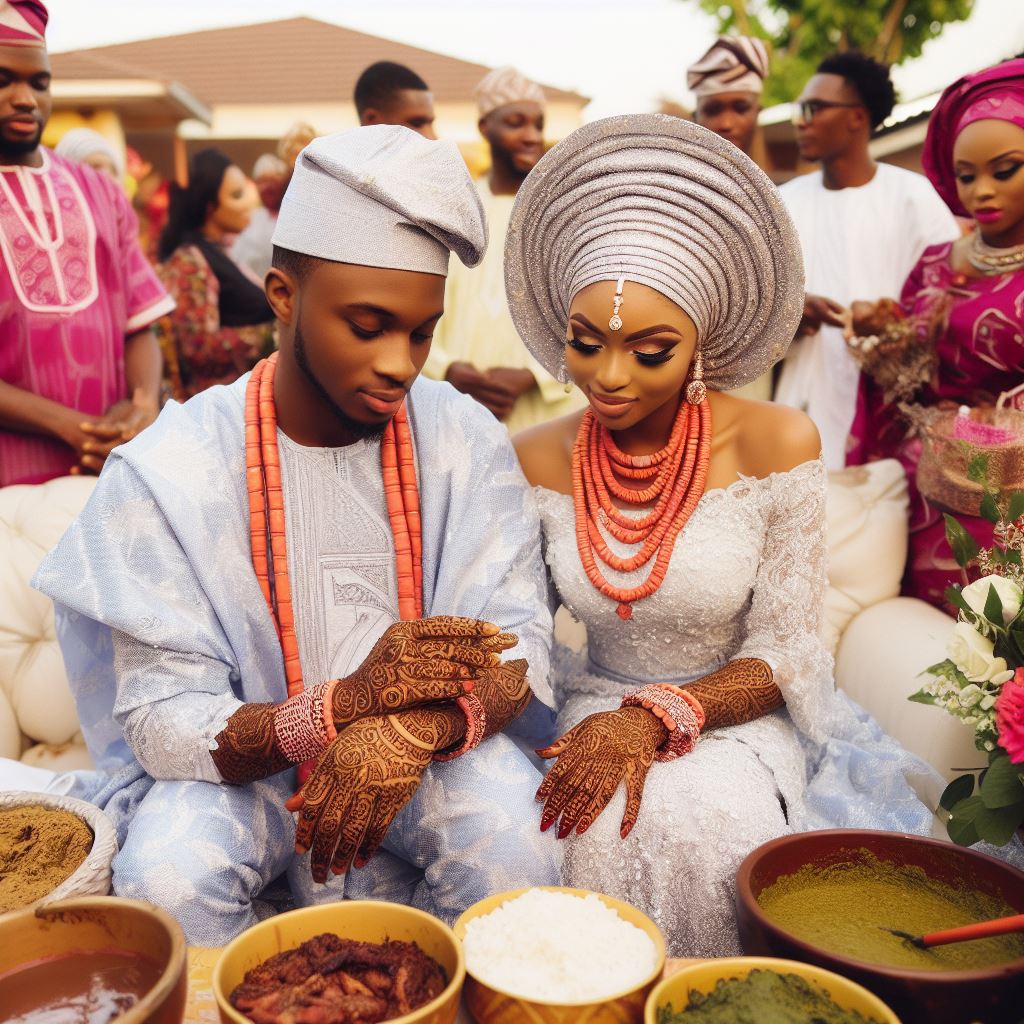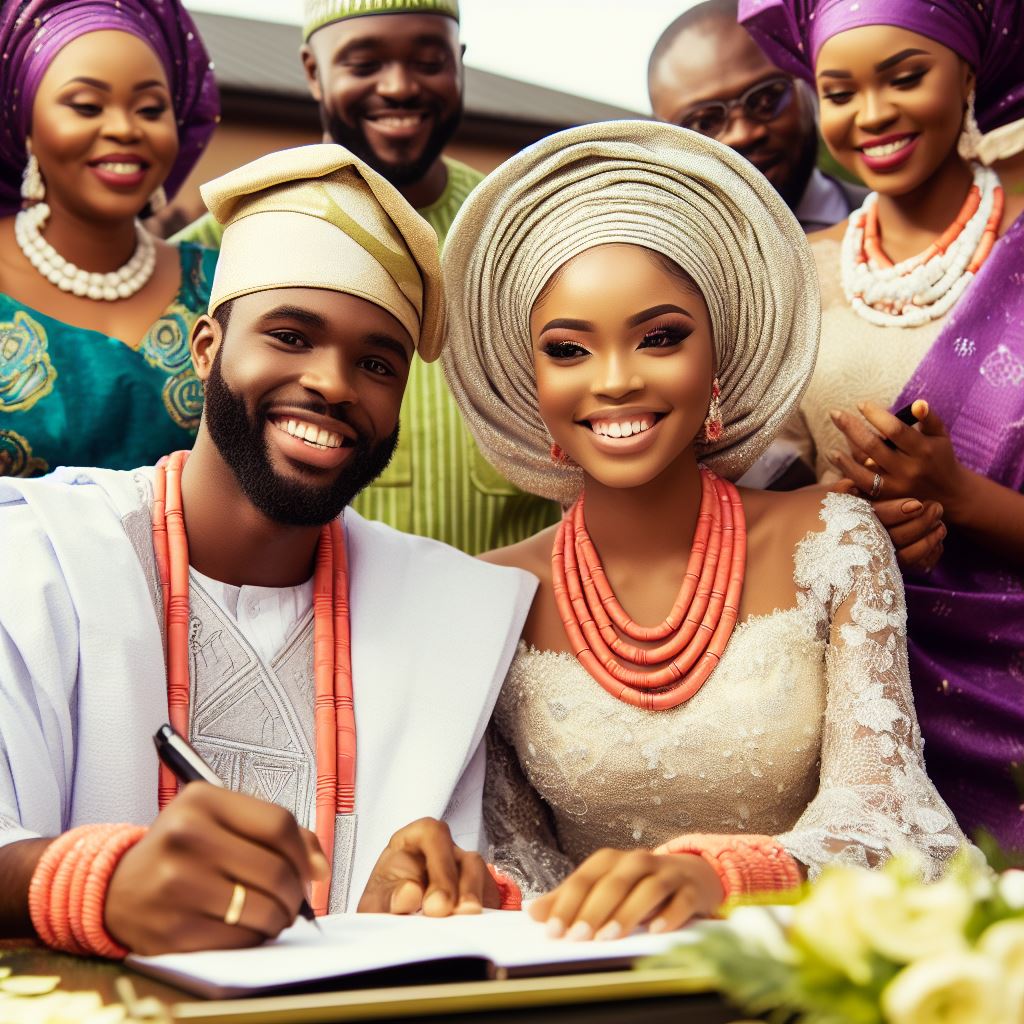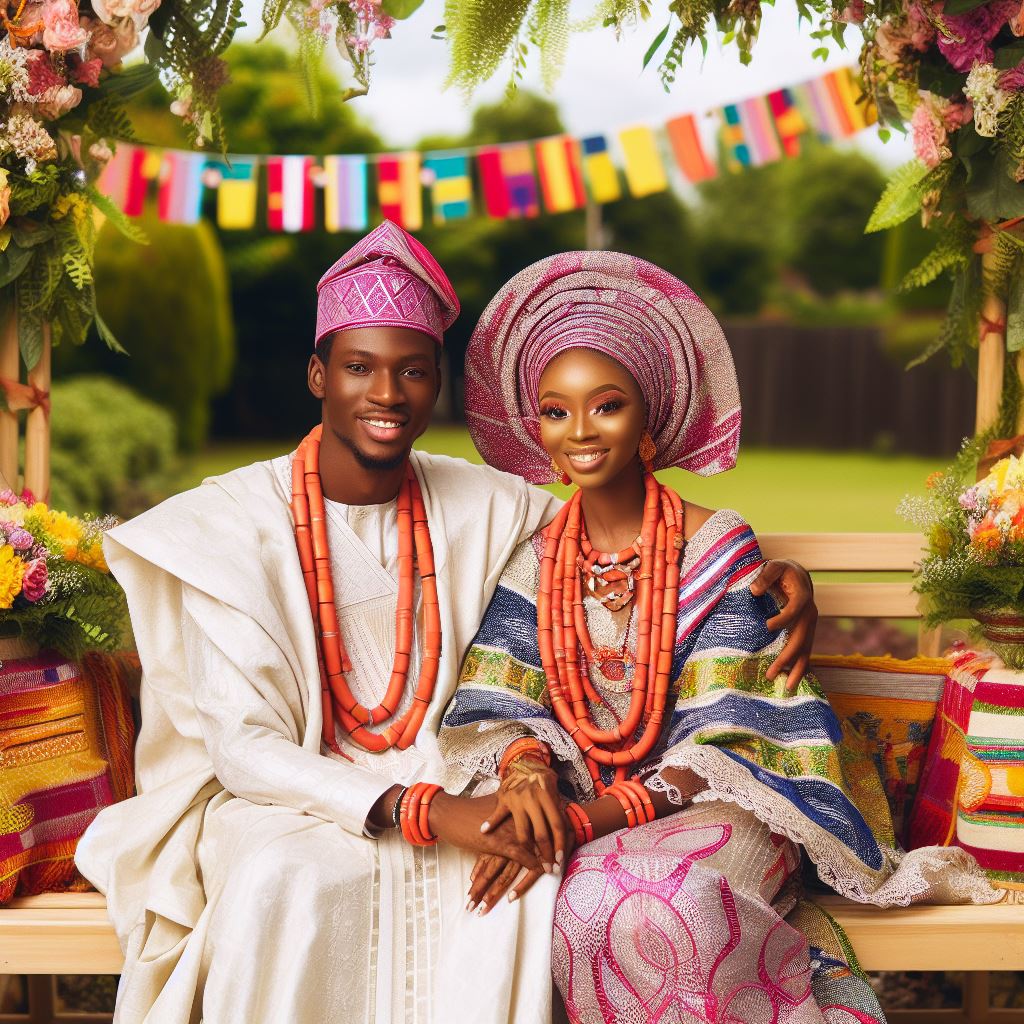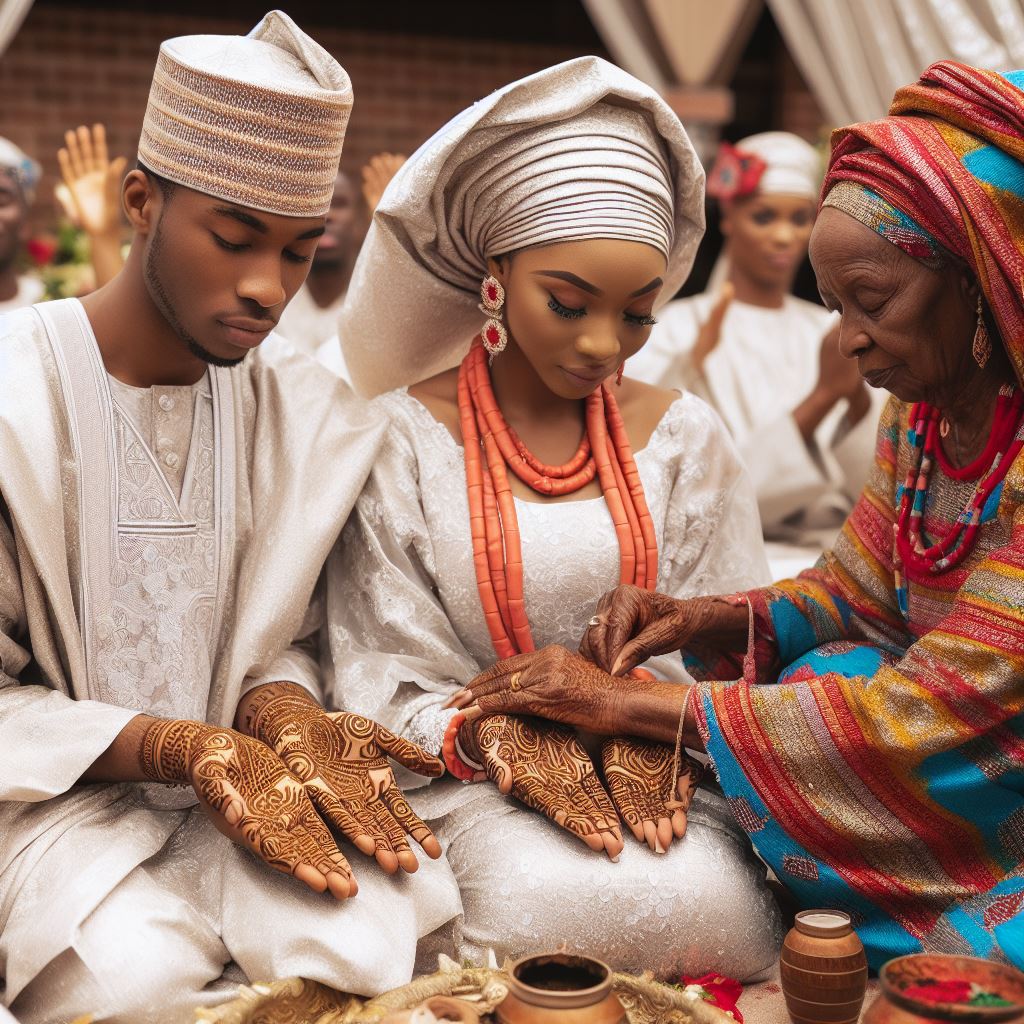Introduction
Wedding blessings hold significant importance in Hausa culture, and this blog post aims to offer insights into the traditional wedding blessings in Northern Nigeria.
This glimpse into their customs promises an enriching experience.
In Hausa culture, wedding blessings play a vital role in solidifying the union of two individuals. These blessings are imbued with deep cultural and religious significance.
One of the primary purposes of wedding blessings is to seek divine intervention and blessings for the couple’s journey together.
It is believed that these blessings ensure a prosperous and harmonious marriage.
Hausa wedding blessings typically involve the gathering of family members, friends, and religious leaders.
They come together to offer prayers, recite Quranic verses, and perform rituals that symbolize the couple’s commitment and unity.
The blessings also serve as an opportunity for the couple to receive guidance from their elders and seek their blessings for a successful marriage.
It is a way of honoring and respecting the wisdom and experience of older generations.
During the ceremony, the couple is showered with heartfelt prayers and well wishes for a blissful married life.
The blessings encompass various aspects such as fertility, financial stability, mutual understanding, and everlasting love.
The traditions and customs surrounding wedding blessings in Northern Nigeria reflect the rich cultural heritage of the Hausa people.
These blessings serve as a testament to the values of family, community, and spirituality that are deeply ingrained in their society.
Through this blog post, we hope to offer a glimpse into the beauty and significance of Hausa wedding blessings, showcasing the traditions that continue to shape Northern Nigeria’s cultural landscape.
Background of Hausa Wedding Blessings
Hausa ethnic group and their significance in Northern Nigeria
The Hausa ethnic group holds a significant place in the diverse and culturally rich Northern Nigeria.
With their distinct customs, traditions, and practices, Hausa weddings are no exception. Wedding blessings form an integral part of these ceremonies, carrying profound spiritual meaning.
In this section, we will delve into the background of Hausa wedding blessings, exploring the Hausa ethnic group, their significance in Northern Nigeria, and the cultural and religious diversity prevalent in the region.
The Hausa ethnic group, one of the largest tribes in Africa, predominantly resides in Nigeria’s Northern region.
With a population of over 30 million, they contribute significantly to the sociopolitical and economic landscape of the area.
Known for their rich cultural heritage, the Hausa people are famous for their artistic talents, especially in the fields of textile weaving, leatherwork, and pottery.
Their language, also called Hausa, serves as a lingua franca in the region, fostering unity and communication across diverse tribes.
The cultural and religious diversity in Nigeria
Nigeria, a country with over 250 ethnic groups, is a tapestry of cultural and religious diversity.
Each ethnic group contributes its unique customs and traditions, making Nigeria a vibrant mosaic of colorful celebrations.
The Hausa people, with their dominant presence in the North, exemplify this diversity.
They practice Islam, with a blend of traditional African beliefs, reflecting the fusion of their religious and cultural identity.
Hausa weddings beautifully highlight this fusion, with wedding blessings playing a pivotal role in the celebration.
Wedding blessings in Hausa weddings and their spiritual meaning
Wedding blessings form an integral part of Hausa weddings, carrying immense spiritual significance. These blessings serve as a way to invoke divine favor, seek protection, and ensure a prosperous union.
Islamic scholars or respected elders perform them, reciting Quranic verses, praying, and sprinkling blessed water on the couple.
The spiritual meaning behind these blessings lies in the belief that they serve as a source of guidance, protection, and harmony throughout the couple’s marital journey.
In closing, Hausa wedding blessings hold a significant place in the rich tapestry of Northern Nigeria’s cultural and religious diversity.
The Hausa ethnic group, renowned for their artistic talents and contributions to the region, showcases their unique customs and traditions through wedding blessings.
These blessings not only serve as a form of spiritual guidance but also symbolize the union’s sanctity and the community’s involvement in celebrating love and commitment.
Understanding the background and significance of Hausa wedding blessings allows us to appreciate the depth of cultural traditions and spiritual beliefs in Northern Nigeria.
Read: Changing Times: Millennial Perspectives on Marriage in Nigeria
Pre-Wedding Rituals
Traditional pre-wedding rituals in Hausa culture
The Hausa culture in Northern Nigeria has several pre-wedding rituals that play a significant role in preparing the couple for the blessings of marriage.
These rituals involve the active participation of family members and the community.
The significance of these rituals and how they prepare the couple for the blessings
One of the main pre-wedding rituals in Hausa culture is the ‘Kaya A Mata’ ceremony, which translates to ‘the visitation of the bride’s house.’
This ritual involves the groom’s family visiting the bride’s house to formally ask for her hand in marriage.
During the Kaya A Mata ceremony, the groom’s family brings along gifts and presents, usually in the form of money, clothes, and food.
This is a gesture of honor and respect towards the bride’s family and signifies the groom’s commitment to taking care of his future wife.
Another important pre-wedding ritual is the ‘Kayan Zance,’ or the ‘bridal shower.’ This ceremony is exclusively for women and is held in honor of the bride.
It serves as a time for the bride’s female relatives and friends to celebrate with her and offer advice on marriage and household responsibilities.
The Kayan Zance ceremony involves singing, dancing, and sharing words of wisdom with the bride-to-be.
The women also present the bride with gifts, usually in the form of jewelry or household items, to help her set up her new home after marriage.
These pre-wedding rituals hold great significance in Hausa culture as they symbolize the strong bond between families.
They also prepare the couple for the blessings of marriage by imparting knowledge and values that are essential for a successful union.
The involvement of family members and community in these rituals
The involvement of family members and the community in these rituals is crucial.
Family members actively support the couple in wedding preparations, ensuring adherence to traditions.
They offer guidance, advice, and emotional support to the bride and groom, fostering a sense of unity and belonging.
Community involvement in these rituals is also significant as it reinforces the sense of belonging and solidarity among the Hausa people.
The community members actively participate in the ceremonies by offering their blessings, well wishes, and prayers for the couple’s future happiness and prosperity.
These pre-wedding rituals not only serve as a way to prepare the couple for marriage but also act as a means of preserving the rich cultural heritage of the Hausa people.
These rituals pass down community traditions, values, and customs across generations, securing their continuity and importance.
The traditional pre-wedding rituals in Hausa culture hold immense importance.
They prepare the couple for the blessings of marriage, involve family members and the community, and serve as a way to preserve the cultural heritage of the Hausa people.
Read: The Importance of Nikah: Marriage in Islamic Tradition
Wedding Blessing Ceremony
Structure and Components of the Wedding Blessing Ceremony
- The wedding blessing ceremony in Hausa culture consists of several key components.
- The ceremony begins with the recitation of Quranic verses, symbolizing the importance of faith in the union.
- Next, prayers are offered for the couple’s happiness, health, and prosperity in their married life.
- The ceremony also involves the exchange of vows and rings between the bride and groom, signifying their commitment.
- The ceremony concludes with a blessing from the Alkali, the religious leader.
The Role of the Alkali in Conducting the Blessings
- The Alkali plays a vital role in the wedding blessing ceremony in Hausa culture.
- As a respected religious leader, the Alkali guides the couple through the ceremony and performs the blessings.
- The Alkali ensures that the ceremony adheres to religious customs and traditions.
- The Alkali offers guidance and advice to the couple for their future life together.
Prayers, Recitations, and Quranic Verses in the Ceremony
- During the wedding blessing ceremony, prayers are recited to invoke divine blessings for the couple.
- The prayers focus on seeking happiness, love, and prosperity for the newly married couple.
- Recitation of Quranic verses is an essential part of the ceremony, emphasizing the spiritual significance of marriage.
- These verses are carefully selected to reflect the couple’s hopes for a harmonious and blessed life together.
The Importance of Blessings for the Couple’s Future Life Together
- Blessings hold great importance in Hausa culture, as they are believed to bring divine favor and protection.
- These blessings are seen as a source of strength and guidance for the couple’s future journey as husband and wife.
- The couple hopes that the blessings received during the ceremony will bring them happiness, prosperity, and a lasting union.
- The blessings are believed to create a strong foundation for the couple’s relationship, ensuring their love endures any challenges they may face.
Ultimately, the importance of blessings for a couple’s future life together is a personal matter, and
the couple’s beliefs and values should guide their approach to seeking and receiving blessings.
Read: How to Prepare for a Halal Muslim Wedding in Nigeria

Symbolic Gestures and Traditions
Hausa weddings are a tapestry of rich symbolism and traditions, reflecting the vibrant culture of Northern Nigeria.
Exchange of Gifts
The exchange of gifts is a pivotal tradition, symbolizing the couple’s commitment to support and provide for each other.
Pouring of Water
Pouring of water is a beautiful custom, representing the purity and cleansing of the couple’s journey into marriage.
Tying Knots
Tying knots, literally and symbolically, signifies the unbreakable bond and unity that marriage brings.
Deep Symbolism
These traditions hold deep meaning. The exchange of gifts signifies mutual respect, trust, and the promise of a secure future.
Cleansing Ritual
The pouring of water is a symbolic cleansing, washing away any past troubles or impurities, and ensuring a fresh start for the couple.
Unbreakable Union
Tying knots during a Hausa wedding isn’t merely about the physical act but a representation of the unbreakable union forged between the two individuals.
Importance of Gestures
These gestures are crucial. They symbolize the unity, love, and blessings that are being bestowed upon the couple.
Read: Inspirational Stories from Memorable Nigerian Weddings
Find Out More: Unique Ways to Wish a Nigerian Couple a Happy Anniversary
Post-Wedding Celebrations
The festivities and celebrations that follow the wedding blessings in Hausa culture
After the wedding blessings in Hausa culture, the festivities and celebrations kick off with immense joy and excitement.
The significance of these celebrations in reaffirming the blessings for the couple
These celebrations hold great significance in reaffirming the blessings bestowed upon the newly married couple. The entire community comes together to honor and support the union.
One notable aspect of these celebrations is the involvement of music, dance, and traditional attire. Music plays a vital role in creating an atmosphere of jubilation and merriment.
The involvement of music, dance, and traditional attire in these celebrations
The drums pound, the flutes sing, and the voices blend to captivate the audience.
Guests are encouraged to participate in the lively dances, creating a sense of unity and togetherness.
Traditional attire also plays a crucial role in these celebrations. Both the bride and groom don traditional Hausa attire, showcasing their rich cultural heritage.
The bride is adorned in a stunning embellished gown known as a “Zane” or “Gindiri.” This regal attire, often adorned with intricate embroidery and beading, symbolizes her beauty and grace.
The groom, on the other hand, wears a “Baban riga,” a flowing robe often made with vibrant, handwoven fabric. This attire signifies his noble status and solidifies his connection to his Hausa roots.
The combination of music, dance, and traditional attire creates a visually stunning and emotionally charged atmosphere during these celebrations.
Furthermore, these post-wedding celebrations serve as a means of reaffirming the blessings bestowed upon the couple.
People believe that joy and celebration increase the likelihood of blessings in marriage.
The presence of family, friends, and community members further strengthens the blessings by providing continuous support and well-wishes for the couple’s future.
Esteemed community elders actively offer heartfelt prayers and blessings to the couple during these celebratory moments.
Conclusion
Hausa wedding blessings hold great significance in Northern Nigeria.
These blessings not only symbolize the union of two individuals but also represent the unity and harmony of families and communities. They are a reflection of the cultural richness and diversity of Nigeria as a whole.
Wedding traditions in Nigeria offer a deeper insight into cherished customs and values in Nigerian society.
It is important to appreciate and respect different wedding customs around the world, as they provide a unique insight into the beliefs and traditions of different cultures.
By learning from and appreciating these customs, we can foster greater understanding and respect for one another. Weddings have the power to bring people together and celebrate the beauty of cultural diversity.
So, let us embrace the Hausa wedding blessings not only as a glimpse into Northern Nigeria but as an opportunity to appreciate and learn from the various wedding customs that exist worldwide.
By doing so, we can foster a sense of unity and understanding that transcends borders and celebrates the diversity of our global community.



